'The Cassiciacum Thesis' – an explanation for the current crisis in the Church?
Bishop Guérard des Lauriers proposed a 'thesis' to explain the crisis and why the post-conciliar claimants were not true popes. Fr Belmont's approach may differ from what you have heard elsewhere.
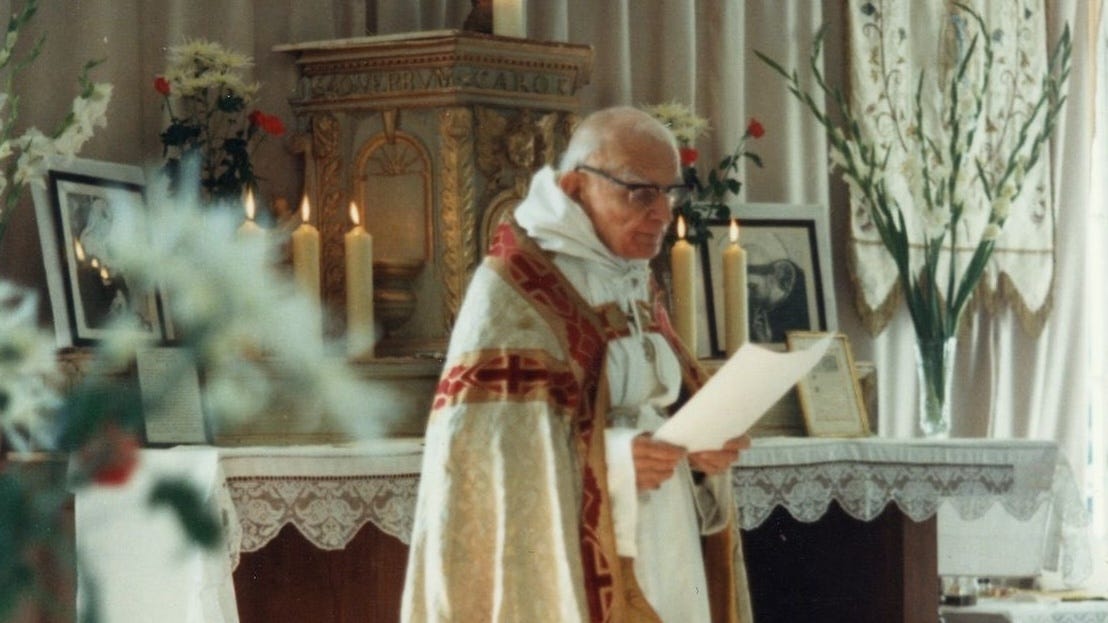
Editor’s Notes
On a few occasions, I have referred to the “the cassiciacum thesis” in passing and, where it seemed necessary, mentioned that I do not hold to it.
I do not want to spend too much time explaining why this is, or arguing with those who do hold it. Overall, I broadly agree with this analysis on the matter, and at least for the present, I think:
That it is not strictly necessary to have recourse to this “thesis” in order to explain the Crisis
That some of the concepts or distinctions, asserted as a means of proposing Guérard’s ideas, are at least debatable
That many of its advocates show limited sign of understanding the reservations which some of us have – still less of answering them.
As an aside, I also disagree with some of the more grandiose claims made for this “thesis” by its Anglophone proponents, and object to the conduct of a few of prominent online advocates.
I also object to the way in which such advocates conduct themselves towards other explanations, as if they are “competition” that needs to be rhetorically destroyed or rubbished. This is counter-productive for everyone.
First, it cannot help but give the additional impression that “The Thesis” cannot stand on its own merits, but is instead reliant on rhetorical fireworks.
Next, even if (for example) arguments from personal heresy were indeed flawed, they are not mutually exclusive with all the other arguments used to propose “the thesis.” There is a difference between the “destroy and rubbish” rhetorixal tactic used by some anglophone advocates, and and saying (as Fr Belmont appears to say) that one avoids certain arguments, and explaining why, even in forceful detail.
The latter is respectable. But the rhetoric, and the cutting the undecided off from perfectly good arguments about “personal heresy,” are risky strategies: if such undecided persons are not then convinced of “the thesis,” they will typically conclude that Francis must be the pope after all. In other words, those using these rhetorical tactics could be said to be “keeping others in the Novus Ordo.”
Next, if the presentation of the cassiciacum thesis is too tied up in supposed problems with arguments based around personal heresy, then this thesis itself is necessarily undermined as such problems are shown to be trivial.
This is an example of why our claims should be as reserved and minimalist as possible. This presents “smaller targets,” which are thus harder to refute; whereas more expansive platforms, presented as a package, necessarily limit the number of persons convinced and are more open to refutation.1
However, the more plausible arguments that there are on the table, the better. Even if one does not adopt the cassiciacum system in its entirety, there are arguments and principles employed which can also be used as additional strings to the “Bellarmine sedevacantism” bow.
In other words, even if the cassiciacum proponents strongly believe that some of the arguments they use point solely towards their own conclusions, there is nothing to prevent us from benefitting from them too.
In any case, it is important to realise that “Bellarmine sedevacantism” (or whatever it is to be called) is not particularly based on one side of the debate about the “heretical pope,” nor on canon law. Rather, it is based on principles around membership of the Church, and the nature of the Church herself, including her unity and indefectibility; and it incorporates arguments that some advocates of the thesis believe are theirs alone.
It is also not a monolithic system that can be accurately labelled as “totalism” and critiqued as such.
Abbé Belmont’ text
I have mentioned on several occasions that I find the explanation given by Fr Hervé Belmont, a French priest, considerably more interesting, modest and compelling. Having said this a few times, we have decided to publish a translation of this explanation here. Fr Belmont gave us permission to publish such translations in 2022, but he is unable to approve them personally due to the language itself.
I retain some objections even to his explanation, but I will limit them to brief comments in endnotes to his piece.
I appreciate his presentation, and I believe (as mentioned) that it is better to have more rather than fewer arguments on the table.
S.D. Wright
The Cassiciacum Thesis
Fr Hervé Belmont
Translated by The WM Review
Introduction
Under this somewhat obscure title lies an attempted proof-explanation of the situation of the Catholic Church since the Second Vatican Council.
More precisely, it concerns the Apostolic See of Rome, which finds itself in a very particular condition, as those who have successively occupied it since 1963 have established, promoted, maintained, and extended new doctrines and new sacramental rites that are at times in rupture and diametrically opposed to the Catholic faith, as it was previously professed, and to the heritage of the Apostolic Tradition from which the Church visibly lived until this unprecedented revolution.
Since the doctrine concerning the authority of the Sovereign Pontiff, as well as his infallibility and his universal and immediate jurisdiction over each of the Catholic faithful, is immutable and also pertains to the faith, a clear conflict of allegiance arises. It is this conflict which the Rev. Father Guérard des Lauriers (1898−1987) examined, attempting neither to diminish the doctrine nor to neglect any established facts, so that everyone can continue to practice the Catholic faith in its entirety.
This attempt, in my eyes, is successful and contains a precious light on the nature of pontifical authority, the demand of faith, and the rigor of possible proof. The notes that follow provide some elements of knowledge and reflection on this matter.
The "thesis" of Reverend Father Guérard des Lauriers, the subject of the first Cahier de Cassiciacum, is available on the Damase bookstore website: Cahier de Cassiciacum No. 1
Abbé Hervé Belmont
The Cassiciacum Thesis
I. Brief Overview
In the face of the flood of ambiguities, Protestant-like reforms, and serious errors that have invaded and followed Vatican II, the situation of Catholics determined to preserve the faith and bear witness to it has become paradoxical. Indeed, to oppose the new religion that colonizes the structures of the Catholic Church, it seems necessary to withdraw from pontifical power, and thus reduce to a meaningless word the authority it has received from Jesus Christ. This is itself another new religion, as deviant as the one of Vatican II being combated.
To resolve this dilemma (for it is indeed a true dilemma) – or more precisely, to meet the demands of the faith without renouncing Catholic doctrine – the Rev. Father Michel-Louis Guérard des Lauriers, a Dominican priest renowned for his fidelity, knowledge, and arduousness, developed a proof/explanation which he shared with his friends, then published in a theological journal created for this purpose: Les Cahiers de Cassiciacum.
As a result, this proof/explanation received (from whom, no-one knows) the name of The Cassiciacum Thesis, under which it is now known.
It consists of the following (which is only a brief outline):
The starting point is an induction: the entirety of Paul VI's acts (since it was he who then sat in Rome) contributes to the destruction of the Catholic religion and its replacement by the religion of man in a form of latent Protestantism. Hence follows the certainty that Paul VI does not have the habitual intention of procuring the good/end of the Church, which is Jesus Christ plenum gratiæ et veritatis (full of grace and truth).
The habitual intention to procure the good of the Church is a necessary condition (the ultimate disposition) for an elected pope to receive the communication of the pontifical authority, which makes him be with Jesus Christ, and hold the role of His Vicar on earth.
Consequently, Paul VI is devoid of all pontifical authority; he is not Pope formaliter (formally); he is not the Vicar of Jesus Christ. In a word, he is not Pope.
His acts are therefore devoid of all magisterial and canonical authority. Thus, one sees how it is possible for Paul VI's acts to be contrary to the Catholic faith and incompatible with pontifical authority – and that affirming this does not at all deny the prerogatives of a Pope, particularly his infallibility and his universal and immediate jurisdiction.
However, this proof says nothing about Paul VI's person, for the intention denied him is not his personal intention (finis operantis, which remains out of consideration) but the objective intention that is habitually immanent to his acts (finis operis). Therefore, it does not allow one to affirm that Paul VI is personally outside the Catholic Church due to the sin of heresy or schism.2
This necessitates affirming that if Paul VI is not Pope formaliter, he remains, however, Pope materialiter, as a simple elected subject, sitting on the pontifical throne, neither Pope nor anti-pope.3
To briefly characterize the Cassiciacum Thesis, two points should be noted.
The first is that the said thesis consists of an induction, that is, a reasoning based on experience (in this case, the observation of the habitual convergence of Paul VI's acts), which states a proposition derived from this basis, and concludes with a verification.
This inductive nature, with the type of certainty to which it leads the mind, accounts for the introduction of the distinction: Pope materialiter/formaliter. This is the second notable point.
We will have the opportunity below to return to the verification that completes the induction. Meanwhile, it is important to pause a bit at the materialiter/formaliter distinction, as its interpretation has often been hindered by a kind of "reification."
It is not at all about affirming that there exists a matter of the Pope or a form of the Pope, and that the Popes of Vatican II are a kind of formless pontifical modelling clay, or a key that has not been filed to fit the lock. This is a simplistic reading, affected by those who keep repeating that "there is no matter without form" and that this distinction is therefore nonsensical.
It is about expressing a relationship, or the absence of a relationship, required by the nature of things. The analogy with sin illustrates this well.
A note for the “simplists” just mentioned: as we are dealing with an analogy, it must be kept in mind that there are more differences than similarities; and that the highlighting of the similarity is not meant to prove anything, but rather to make the materialiter/formaliter relationship graspable by the intellect. This is what concerns us in this instance.
If I tell others about a neighbour’s bad action, if this action is harmful, if I speak with a right intention, if I address only those who need or must be informed, if there is a proportion of gravity between my account and the bad action, then I perform a upright action, which is not a sin.
If it turns out that the neighbour never actually committed the action in question, and that I was deceived without there being any recklessness or rashness on my part, my account is not a sin for me. The moral qualification of my action does not change.
But there is still an objective disorder, a failure in truth, harm to the neighbour's reputation: and that is not nothing. It entails a moral obligation of prompt, proportionate, and effective retraction.
There is material sin, there is no formal sin. This simply material sin (materialiter tantum) is nothing from the point of view of guilt: my conscience is not burdened, I have not committed sin. But, this action is not therefore a good act. From the point of view of sin, it is thus a nothing, but... and this "but" can become sin if I do not meet the resulting obligation.
Similarly, a Pope materialiter tantum is not Pope; he is devoid of all magisterial and jurisdictional power. From the point of view of authority, he is nothing.
However, from the point of view of the papacy, he is a nothing, but... although deprived of all that makes a pope a Pope, he ensures a certain continuity on the Apostolic See, where he possesses some title, juridical or potential, to be present – which we will examine shortly.
This state of affairs prevents him from being rightly called an anti-pope.
II. My Adherence
A. Adherence to the Theological Intention
What is not explicitly stated is nonetheless present throughout the exposition of the Cassiciacum Thesis; it is the intention that animates it and presided over its elaboration: a theological intention. It is not only about wanting to preserve the Catholic faith, not only about basing oneself on the statements of the Catholic faith, but about implementing this virtue of faith, about remaining in its light. This theological intention is the conviction that the correct discernment of the situation of the Church, of its authority, and the corresponding duty of the faithful can only come from the exercise of faith. This discernment can only exist rightly and safely within the act of faith, and necessarily linked to it.
For this theological intention, my gratitude is immense towards Rev. Fr. Guérard des Lauriers; my adherence goes without reservation to what is most fundamental in the Cassiciacum Thesis.
B. Adherence to the Doctrine of Authority
One of the major points of the Cassiciacum Thesis is the exposition of the doctrine of authority, particularly the essential difference (which does not prevent analogical unity) between various natural authorities and the supernatural authority of the Pope.
What constitutes a natural authority, its very essence, is ordering to the common good, the charge of the common good existing in a person designated by a fact of nature (paternity, for example) or in another manner (heredity, election, conquest, etc.).
Since pontifical authority is a vicarious authority, that which is constitutive of it is “l’être avec Jésus-Christ,” [Ed.: a key concept to the Cassiciacum Thesis, and difficult to render in English – the state of being with Jesus Christ]. This is the supernatural communication of Jesus Christ's authority in a person placed at the head of the militant Church.
The ordering to the common good obviously remains (otherwise, there would not even be an analogy), but it is no longer constitutive: it is a necessary condition, as well as necessary credibility.
The Cassiciacum Thesis includes valuable developments on these questions which are compelling of our assent.
C. Adherence to the "Body of the Thesis"
The body of the thesis was stated above, and I fully subscribe to it. I repeat:
Paul VI (and his successors who follow him in this) did not have the habitual intention (effective, efficacious, immanent to the acts) to procure the good/end of the Catholic Church.
He was therefore incapable of receiving the communication of Jesus Christ's authority, as this intention is the ultimate disposition of the subject to receive the communication of pontifical authority. Like any ultimate disposition to the reception of form, it is on the side of matter (the subject), but it is the effect of the form (the being with Jesus Christ).
From the perspective of the faithful, this habitual absence of intention – perfectly observable to one who exercises faith, as the right intention should be immanent to the acts that govern faith – prevents adherence to a non-existent authority. Indeed, it manifests as a lack of credibility (or even an “absurdity of credibility”) which has the same effect as if two contradictory propositions were simultaneously presented as revealed by God: reason cannot adhere. As much as reason can (and eventually must) adhere to what surpasses it, and to what may even confound it, it cannot adhere to what extinguishes the light that God has placed in it (for the extinction of this light would nullify faith itself, which would be deprived of a subject of adhesion).
D. Adherence to the Essential Conclusion
Consequently, I adhere without reservation to the main conclusion of the Cassiciacum Thesis: Paul VI is not Pope formaliter, he is in no way the holder of pontifical authority, he is not the Vicar of Jesus Christ, all his acts are null and void.
This conclusion seems particularly solid for the following reasons:
The conclusion does not go beyond the proof. This proof is based on the observation of Paul VI's acts, not on the qualification of his person; the conclusion stays within the same domain.4
The reasoning does not refer to theological theses (on the case of a heretical or schismatic Pope) which, however true and venerable, are only permitted theses.5 Since these theses have not been assumed by the Church, they do not necessarily govern the Catholic intellect, and their implementation would not maintain a certainty pertaining to the Catholic faith.6
The reasoning does not consider Paul VI's state of conscience or that of any of his successors; it abstracts from the sins of heresy or schism they might have committed and which would personally place them outside the Church. Without the intervention of legitimate authority empowered to command the act of faith, one cannot categorically affirm the formality of any heresies they may have uttered.7
The induction culminates in verification, an operation in which it draws its unity and the firmness of its grasp of the unum convertible with being. This can be a crucial experience, an authorized and proportionate testimony, the analogy of faith, the rejection of a contradiction.
The induction constituting the backbone of the Cassiciacum Thesis is doubly complete, with by reference to the habitual intention of Paul VI and the absence of pontifical authority in him.
First, the immense catastrophe that accompanied and followed Vatican II is indeed Paul VI's work. Not only because, when the deleterious fruits appeared, he maintained their causes – thus manifesting that they entered into his intention – but also because he himself adopted these causes, claimed them, defended them, and sought to communicate to them all the necessary authority. This he did vehemently in the address to the Consistory on May 24, 1976 (AAS 1976, pp. 372-377).
Among the many acts of Paul VI that contributed to the change of religion, some, even taken separately, are strictly incompatible with pontifical authority. One thinks, of course, of the affirmation that religious freedom is founded on divine Revelation, and also the liturgical reform. These acts serve as crucial evidence, thus completing the induction – and by this, they communicate to this induction a certainty pertaining to the light of faith. The autonomy that the argument based on these acts seems to possess does not change the inductive nature of the Cassiciacum Thesis, because, in return, one is assured of making neither a misreading nor an erroneous interpretation of these crucial acts, by the fact that they take place in a series of acts all converging towards the same upheaval of the faith, liturgy, and Catholic discipline. It is because of this return that the reasoning remains inductive in nature.
The conclusion remains in the light of faith because the reasoning does not stray outside this light; thus, the reasoning only expresses and clarifies a necessity that pertains to the exercise of the Catholic faith.
E. Reflection on the term “Materialiter”
Paul VI remains pope materialiter: this was and is the most original part of Fr. Guérard des Lauriers' thesis. It is often misunderstood: it is seen as a kind of division of pontifical power – which cannot be conceived – or as a subterfuge to avoid making a decision, even a camouflage.
The affirmation of this permanence of the materialiter in the de facto occupants of the Apostolic See responds to a triple concern:
Necessary adequacy to the proof. Since it says nothing about the personal situation of Paul VI and his successors regarding the possession (or not) of theological faith, the conclusion must not go beyond that.
Taking into account the fact of the peaceful occupation of the Apostolic See. Let’s understand: this occupation is extremely violent and illegitimate from the perspective of faith and the good of the Church, it cries out for vengeance before God. But, in fact, it has not been and is not significantly contested: it remains a massive fact, visible to all, which may not be without consequences.8
The apostolicity of the Church, which requires continuity such that the next true Pope appears as the successor of the last and thus as the successor of St. Peter – and thus is so in reality.
Now, if we inquire about the exact meaning of materialiter, about its content, we must consider the passage of time and the real changes it brings. There was in Paul VI a juridical fact: he was the subject elected by the cardinals and recognised by them; this juridical reality has frayed in the following conclaves as the number of true cardinals continued to decrease. For the election of Francis (Bergoglio), there were none left. And so the consistency of materialiter has not remained identical. The materialiter that can be attributed to Francis I (Bergoglio) is quite tenuous: since nothing remains of the juridical order, there is only a public fact (his being-there) which is only a proximate disposition to be recognised by the universal Church in case of a break with the new religion of Vatican II. There is still continuity (which is not without impact on the apostolicity of the Church), but this continuity is a potential continuity.
F. Perplexity in the Face of Two Developments of the Thesis
Two subsequent developments of the Cassiciacum Thesis seem to me to be at odds with its theological character and the rigour it deploys in its exposition.
The first is from Fr. Guérard des Lauriers himself. The drafting of his work was completed in 1978: it is the core of the thesis, found in the first issue of the Cahiers de Cassiciacum on pages 33-99. For the publication in the Cahiers, he added a Warning (p 11) that contains a not very credible extension of his thesis: the author asserts that as infallibility is attached to the physical person of the pope, Paul VI could have (though he did not) activated the charism of infallibility by posing an act of the extraordinary Magisterium.
I cannot adhere to this hazardous assertion for four reasons:
It relies on an erroneous memory of the teaching of the Vatican Council. The latter, in the decree Pastor Æternus (July 18, 1870, Denzinger 1839), affirms that the Pope "enjoys, by virtue of the divine assistance promised to him in [the person of] the blessed Peter, that infallibility with which the divine Redeemer willed his Church to be endowed in defining doctrine concerning faith or morals; therefore, such definitions of the Roman Pontiff are of themselves, and not by the consent of the Church, irreformable." The personal character of infallibility can only refer to the succession of St. Peter in divine assistance, and to the fact that no further consent, episcopal or otherwise, is required. The council, therefore, affirms nothing suggesting that it would be a privilege attached to the physical person; rather, it presents it as a privilege attached to pontifical authority [2];
It seems to assume that pontifical power is divisible, fractionable: which is erroneous and impossible;
It overly equates infallible with extraordinary. The definition from Vatican I does not limit papal infallibility to the ex cathedra declaration; moreover, the word extraordinary is unknown in the definitions concerning the magisterium and does not have the same scope as ex cathedra in Pastor Æternus.
It contradicts what Fr. Guérard des Lauriers rightly asserts in the body of his own thesis (on pages 97 and 99), namely that Paul VI should be ignored and not be mentioned.
The second development I resist is more recent, and in fact, I do not know to whom it should be attributed. It is the assertion that not only are we dealing with a pope who is materialiter tantum, but also that we are dealing, in Rome and in all the dioceses of Christendom, with an entire hierarchy materialiter, from bishops and cardinals and practically even down to sacristans.
This also seems erroneous for the two imperative reasons below:
For the apostolicity of the Catholic Church considered under the aspect of continuity, only the succession of the Apostolic See matters. The permanence of each of the other sees is not essential: there is no necessity of faith (and therefore no adequacy to reality) to affirm a materialiter about them;9
The nominations of cardinals and bishops are acts of pontifical jurisdiction, which is precisely absent and which nothing can replace – whereas the nomination of the Sovereign Pontiff is in no way an act of jurisdiction, which makes the question of the Roman See radically different from that of particular sees or the Sacred College.
G. The Cassiciacum Thesis is also a useful good
The Cassiciacum Thesis is true for itself, as it is a full and complete confession of the Catholic faith in conformity with all Catholic doctrine and proven facts, and inherent to the exercised faith.
Thanks to this, it is also a fine instrument of discernment which will be precious to us in distinguishing the moment when – by a truly miraculous grace of God – authority will be restored. Moreover, it has appeared as a high bulwark against all kinds of follies that began to emerge here and there, a reasoned barrier against deviations to be feared in a situation of anarchy: conclavism, millenarianism, episcopal consecrations,10 apocalypsomania, sectarianism, survivantism, doctrinal errors diminishing papal authority, justification of disobedience, free examination, schismatic spirit due to the refusal to recognize many Catholics as members of the Mystical Body of Jesus Christ, predominance of "security" over truth, etc.
Finally... it should logically have been this bulwark. But the confusion of minds has reached such proportions that invoking logic has become naivety.
Fin.
Fr Belmont’s Notes
[1] Brief technical note.
A reasoning is an operation of the mind (of human intelligence) that advances knowledge by leading it from the known to the unknown, producing a new apprehension of being, a new judgment. Induction and deduction are two very different kinds of reasoning, but both lead (if well conducted) to certainty: in both cases, the mind adheres to a new proposition without fearing error. However, these certainties are of different qualities because the mind's adherence is diverse. Certainty arising from deduction is a certainty that imposes itself, while certainty arising from induction is a certainty that is constructed.
In deduction, the apprehension of the unity of the middle term is instantaneous (even if it takes time to fully grasp the problem, this reflection is only preliminary); this apprehension of unity is an apprehension of being (ens et unum convertuntur) and legitimises a new judgment, which is thus placed under the light of the principles from which it originates.
In induction, the mind gradually constructs a proposition (a hypothesis) from observed facts, then devises ("invents") the verification of this proposition, while apprehending the unity of its operation, that is, the unity of the proposition as stemming from observation, and of the proposition as calling for this verification. This completed verification validates the proposition and gives it the status of a firm judgment. This certainty is more laborious but more human and becomes more structural in the life of the mind that benefits from it.
The proposition arising from induction is (all other things being equal) better apprehended in understanding than that which arises from deduction because the process that engendered it remains more immanent. Its certainty is therefore of a different quality (less immediate, less independent of reasoning, but deeper and more intimate to the mind).
The verification in which induction culminates is necessary because human intelligence does not see the universal nature of things in a collection of singular cases. It is therefore necessary to establish the adequacy of the hypothesis to objective reality. But this verification would not be sufficient if it were isolated: it is operative only as verification, it succeeds only because it is grafted onto the observation that founded the hypothesis. If it were otherwise, if the isolated verification were a true demonstration, it would no longer really be an induction (as in the case of reasoning by recurrence in mathematics).
[2] This "physical person" reading of the Pastor Æternus decree was precluded by the Deputation of the Faith (Bishop Vincenz Gasser), who clarified before the definition of the infallibility of the ex cathedra locution the precise meaning and implications of the text to be voted on:
"Petrus extra hanc relationem ad Ecclesiam universalem positus in suis successoribus hoc veritatis charismate ex certa illa promissione Christi non gaudet — Outside their relationship to the universal Church, Peter and his successors do not enjoy this charism of truth which was given to them by the certain promise of Jesus Christ"
(Mansi, lii, 1214 b, cited by J.-P. Torrell o.p., "Is Papal Infallibility a 'Personal' Privilege?", Revue des Sciences Philosophiques et Théologiques, xlv, 2, April 1961, p. 244).
Thanks again to Fr Belmont for providing this presentation of the cassiciacum thesis. You can visit Fr Belmont’s website here.
Please do read the footnotes below, which discuss some of our reservations with even Fr Belmont’s exposition.
Read Next:
HELP KEEP THE WM REVIEW ONLINE!
As we expand The WM Review we would like to keep providing free articles for everyone. If you have benefitted from our content please do consider supporting us financially.
A subscription from you helps ensure that we can keep writing and sharing free material for others.
Plus, you will get exclusive access to our weekly Editors’ Updates!
Thank you!
Notes on certain reservations – expressed in a spirit of appreciation:
To be specific, I am thinking of the tendency found at least amongst many Americans to treat “sedevacantism” as a platform or “position” which necessarily entails certain non-negotiable positions on:
The cassiciacum thesis itself (for or against)
The validity of Novus Ordo orders and some other sacraments
The legitimacy of attending a Mass in which the celebrant names a false pope (see another side of Bishop Guérard des Lauriers’ views on this topic here)
The status of claimants such as John XXIII and John Paul I, who do not seem to call for a conclusion with the same degree of urgency as the others
The particular missal which one should use…
… and many other topics.
In fact, each of these subsequent issues are either downstream of the initial conclusion of sede vacante, or independent of it, or merely imply it or point to it.
To treat “sedevacantism” as if it were a monolithic phenomenon, with a statement of required tenets, is counter-productive for a number of reasons. It should be obvious that people are more willing to consider the fundamental conclusion of sede vacante on its own, without the pressure of having to take a position on a host of less important and less clear issues.
“Therefore, it does not allow one to affirm that Paul VI is personally outside the Catholic Church due to the sin of heresy or schism.”
SDW: I think it may be more accurate to say that the observations preceding do not require one to affirm that Paul VI etc. are outside the Church.
“If Paul VI is not Pope formaliter, he remains, however, Pope materialiter, as a simple elected subject, sitting on the pontifical throne, neither Pope nor anti-pope.”
SDW: It does not seem probable that an unaccepted election can simply hang in the ether indefinitely.
Canon Law treats one who fails to accept an office within a given period as tacitly rejecting it; while the pope is above Canon Law, this seems merely to be a provision of reason and natural law. In any case, whatever point this tacit rejection takes place, it does not seem reasonable to think that after 11 years of Francis, the election is still hanging there, awaiting his acceptance.
If he were later to “accept the election,” it is possible that he would accede to the office, but by other means (by some form of acclamation, and/or peaceful and universal adherence), not by virtue of an unaccepted election.
As the above makes clear, let’s note that the argument from his defective consent to the election does not necessitate the cassiciacum thesis as a solution. This was an argument raised by James Larrabee and others many years ago.
“This proof is based on the observation of Paul VI's acts, not on the qualification of his person.”
SDW: It is good and useful to form an argument on this basis. Many of us do so.
But while they may be distinct from other lines of argument, this argument do not necessarily exclude them – as is often asserted or assumed by many anglophone proponents of the cassiciacum thesis.
Even if such arguments excluded each other in themselves, it does not seem to be wrong to lay out a set of arguments, not all of which we personally embrace, and let our interlocutors decide which they find most convincing. To take just one example, this was the controversial method of St Robert Bellarmine in his treatment of the various objections to the papacy. Some of the solutions which he presents are definitely mutually exclusive, but common sense shows us that there is no problem here at all.
“The reasoning does not refer to theological theses (on the case of a heretical or schismatic Pope) which, however true and venerable, are only permitted theses.”
SDW: The question of the heretical pope is one way of approaching the argument from membership; but whereas that question did indeed suffer a few different answers, the theses around membership in both theology and law are now sufficiently clear to make this argument certain.
Further, the arguments of da Silveira do seem to show that theological certainty has been reached on what he calls the ‘conditional [alternative-successive]’ view of St Robert Bellarmine.
“Since these theses have not been assumed by the Church, they do not necessarily govern the Catholic intellect, and their implementation would not maintain a certainty pertaining to the Catholic faith.”
SDW: It does not seem certain that one must have metaphysical certitude or infallible certitude of faith in order to conclude that a given claimant to the papacy is not a Catholic and therefore not the pope. It would seem that moral certainty is the proper kind of certitude for a question like this.
As Aristotle wrote:
“It is the mark of an educated man to look for precision in each class of things just so far as the nature of the subject admits; it is evidently equally foolish to accept probable reasoning from a mathematician and to demand from a rhetorician scientific proofs.”
Nicomachean Ethics, Book 1, ch. 3 (1.3.4) / 1094b.24ff (c. 325 BC) [tr. Ross (1908)]
However, it is true that in most cases, the identity and legitimacy of the Roman Pontiff is a dogmatic fact, but it seems somewhat disputed as to when this certainty is attained.
“Without the intervention of legitimate authority empowered to command the act of faith, one cannot categorically affirm the formality of any heresies they may have uttered.”
SDW: This does not seem entirely correct, as stated. In some cases one can indeed categorically affirm this and adhere to it with moral certainty.
Perhaps one cannot proceed to new elections or physically manhandle usurpers out of usurped sees, etc. – but this is not what is in view here.
One also cannot impose one’s moral certainty on others, or use their disagreement to deprive them of their rights – but this is no less the case for arguments around objective intention, etc. – not that Fr Belmont is suggesting this here.
“Taking into account the fact of the peaceful occupation of the Apostolic See. […]
“[I]n fact, it has not been and is not significantly contested: it remains a massive fact, visible to all, which may not be without consequences.”
SDW: There are two ways of arguing for the conclusion that the universal and peaceful acceptance of the Church establishes a man’s claim as pope as a dogmatic fact. One appears to state that the mere acceptance of the election and/or verbal recognition of the man as pope is sufficient as a proposition of this fact by the Curch. Another, expressed by Billot and others, holds that it is the peaceful and universal adherence of the Church to him as the proximate rule of faith that establishes this.
The post-conciliar claimants have very manifestly not enjoyed this latter sort of adherence. The situation appears unclear.
See below for more details:
“For the apostolicity of the Catholic Church considered under the aspect of continuity, only the succession of the Apostolic See matters. The permanence of each of the other sees is not essential: there is no necessity of faith (and therefore no adequacy to reality) to affirm a materialiter about them.”
SDW: I agree with Fr Belmont, that the arguments presented do not point towards a material hierarchy, and that this is quite an extravagant extension.
I also accept the principle, that the succession of the Apostolic See is itself sufficient to maintain apostolicity, even if there were no other successors of the apostles left.
However, I am far from convinced that this means that it is possible for both the pope and the entire hierarchy to be absent simultaneously, such that the Church would be rendered only potentially apostolic.
That said, if it were the case that all ordinaries died, leaving only the pope and a college of cardinals (including some auxiliar/titular bishops); and if the said pope died, and the cardinals elected a new pope within two days, would it be the case that the Church ceased to be apostolic in that time? Would it really be numerically a different Church?
I do not know what to think here, but it does seem to wrong to think that the Church could ever be wholly without actual, living apostolic pastors and still be apostolic. This does not seem to be what theologians had in mind when they affirmed the principle, true in itself, that the Roman succession is sufficient to secure apostolic succession.



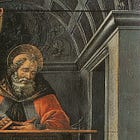
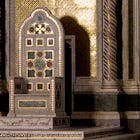


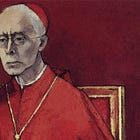
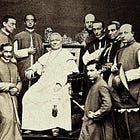




Two points I wished to make as a comment after reading this post are probably much better (or at least more succinctly) articulated in the following comment made by John Daly (enumeration mine):
"[1] There is in any event no need to recur to the materialiter-formaliter vocabulary to enunciate what the thesis holds ... It is more important to seize what a man believes and wants to communicate than to get bogged down in questions of semantics — hence, though I think it regrettable, I have nothing more to say here about the technical Guerardian vocabulary and I shall not be using it again in these notes. [2] I add however that the Cassiciacum thesis is also innocent of the charge of claiming that matter can exist without form. Matter cannot exist without form, but the matter of a particular entity can certainly exist without the due form of that entity, in which case the entity itself is not present."
The correct way to argue the sedevacantist position and avoid the pitfalls of the personal heresy argument is as proposed by Fr Okerulu:
1. The Novus Ordo Church that poses as the Catholic Church is a non-Catholic sect practising a new religion, based on the evil, erroneous, heretical and blasphemous doctrines and laws contained in Vatican II documents, catechisms, 1983 Code of Canon Law and their pronouncements in general.
2. Those who adhere to the Novus Ordo as members are therefore non-Catholics, having publicly defected from the Catholic Faith. They are no different from Anglicans and all protestants and schismatics.
3. Per Canon Law referenced below, Catholics who have publicly defected from the Faith, all non-Catholics, all members of non-Catholic sects, *EVEN WITHOUT ANY DECLARATION,* are unable to hold offices in the Catholic Church, or if previously holding offices, automatically lose such offices.
- Canon 188 no. 4
- Canon 2314 no. 3
4. This obliges all Catholics to ignore the entire Novus Ordo hierarchy as a non-Catholic hierarchy, and makes Masses in which their prelates are mentioned EQUIVALENT to Masses in which the schismatic patriarch of Constantinople or the Anglican Archbishop of Canterbury is mentioned.
5. Traditional Catholic clergy do not require abjuration of converts from the Novus Ordo Church because the absence of ecclesiastical condemnation makes them enjoy the presumption in the juridical order of being deceived rather than formally heretical and adhering to a non-Catholic religion, just as the Church does not require abjuration of members of non-Catholic sects who have reached the age of reason to commit mortal sin but not reached the age of puberty based on presumption of lack of formal adherence. cf Canon 2230.
6. The Church does not maintain a directory of non-Catholic sects nor does she always condemn each one by name. She does not consider it necessary because non-Catholic sects are manifestly so, practising a different religion with different creeds and rites. She does not necessarily declare public defection by individuals but rules to the contrary: that a public defection or mere giving one's name to a non-Catholic sect is notorious in itself to confirm loss of office. Fr Okerulu brilliantly argues that ecclesiastical condemnation does not constitute a non-Catholic sect as such. Non-Catholic sects are constituted by their rejection of the Catholic Faith and institution of new doctrines and rites.
7. EVERY TRADITIONAL CATHOLIC by experience knows the Novus Ordo is a different religion with false doctrines irreverent rites. But it's truly an organisation, acting as a moral body and universally recognised as such. Its decrees and judgments are formal acts of this body, this moral union, this organisation, this sect. It cannot not be called an organisation and its formal acts proceed from it as operations of a moral being. This organisation CANNOT be the Roman Catholic Church! The SSPX and Thesis adherents do not emphasise this conclusion completely founded in reality ONLY BECAUSE they think admitting it impacts the Apostolicity of the Roman Catholic Church. It absolutely doesn't.
See Fr Okerulu's article here. I think it requires some refinement but find the three core conclusions incontrovertible.
https://www.strcnigeria.org/wp-content/uploads/2022/12/A-Defense-of-the-Theological-Sedevacantist-Position.pdf